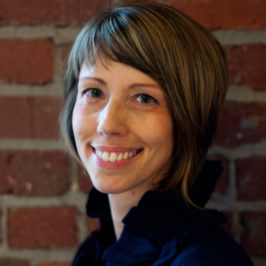In December, I had my first big break as a writer. My essay “Muzzled,” about guns, violence and abuse, was published in True Story, a new imprint of Creative Nonfiction magazine. It was the classic publication success story, from hard work to achievement. For over two years, I toiled with incomplete drafts, switching from nonfiction to fiction and back again. First or third person, fiction or essay, I couldn’t get enough critical distance to tell the story, so I shelved it and moved on.

‘The first agent wrote to praise my writing and reject the book idea…’ Illustration by Josh Quick.
In 2016, I was awarded a residency at Mineral School, a 1950s elementary school cum writing residency in woodsy Mineral, Washington. My first goal was to finish—or, actually, rewrite—this piece. Rather than rework an old draft, I began fresh with a timeline of events. I researched gun violence statistics, mass shootings, literature, my old journals, and psychology articles on abuse. Most importantly, I leveraged the time and solitude to reflect on what my research and memories meant to me. In short, I did the work and came away, finally, with a completed essay.
The process sounds simple, even obvious, but it wouldn’t have happened without many failed attempts. I learned that you can’t rush perspective—it sometimes takes decades rather than years—and that attempting to camouflage my life as fiction was disastrous for me as a writer.
Ultimately, detaching from daily life during the residency helped me uncover this.
Inside my live/work classroom, with its sweeping ceilings and original chalkboards, I treated the story like sculptors treat marble; I patiently pulled away the chaff to uncover the form—a collage essay, a new form for me—rather than impose a strict narrative as I had in all past iterations.
This method allowed me to release a powerful hidden truth: I was so angry at my father growing up that I literally wanted to kill him. My reward was swift acceptance by True Story, although my work was hardly done. It took two more months and four rounds of edits with managing editor Hattie Fletcher and editor Anne Horowitz to make the piece sing.
Though it was the strongest essay I had ever written, I was nonetheless surprised when agents reached out after its release to inquire whether I had representation, or a book in the works.
This was a first. I was unprepared for the task, but I did have ten other essays that fit thematically with “Muzzled.” I had been toying with the idea that they could make a book; now, with agent inquiries, it seemed like my writing career was falling into place. I responded with proposals and sample chapters.
A few weeks later, the first agent wrote to praise my writing and reject the book idea, noting, “The power in this package rests within each self-contained piece, the doll house-like detail, and as a result, I didn’t feel an organic building to another place, a journey through piece to piece, with an arc that bends to a beginning, middle, and end.”
Normally, I weather rejection well, but her letter felled me into a stupor. Not because I took it to mean I was a bad writer, but because I realized I had been futzing with these essays since 2010. Even after seven years of sacrificing early mornings, late nights, weekends, and vacations to take classes and learn how to be a better writer, I had never looked beyond the current page.
When the second email arrived, more praise followed by a slap of market reality, I slumped further. The second agent said, “While it was lovely to spend more time in your company on the page, and you write so well and with such feeling and hard-won clarity, I didn’t find the other essays had quite the singular quality of Muzzled. I missed that feeling of an urgent personal story shining a light on a wider societal trend. As it is, I couldn’t see a clear path to market for your memoir.”
My heart sank at the idea of spending more time and effort to transform these pieces into something cohesive, particularly the older essays whose quality and insight lagged in comparison with my recent work. Plus, there was no assurance that I’d ever find a commercial hook or societal relevance beyond my singular experiences, at least, not one that wouldn’t feel forced. I would be trying to impose form after making all these cuts into the marble.
Having emerged from my pity party, I now appreciate the gargantuan favor that these agents paid me. Their generous critique revealed an illusion that I had unwittingly convinced myself of: all this time, I believed that I was creating small masterpieces when I was actually mastering craft. I was doing the work, but not yet Doing The Work. It only felt that way because building the building blocks is hard. I also lamented lagging behind writers in their twenties and thirties who were already onto their third and fourth books. Writing isn’t a race, but somehow, I felt behind.
In my mind, I upheld models like Rebecca Solnit’s The Faraway Nearby and Roxane Gay’s Bad Feminist as proof that I, too, could press essays like random flowers into a book. My biggest mistake, though, was believing that once I controlled craft, the difficult writing would come with ease—that all the pieces would fall together naturally, or by magic—that they would by happenstance “fit.” Solnit’s and Gay’s work flows with inherent grace, as if they hadn’t planned any of it, when of course they did. Masters always make hard work appear easy.
These two rejections have taught me that mastery of craft only means that I have the capacity to dig deeper into the bedrock, which my blunt beginner’s implements couldn’t have pierced. Simply put, doing the work has given me stamina and tools to Do the Work, but nothing more.
Doing the Work means navigating complex material with intention, honing my intuition as a seeker, and commanding the vision and power to transmute experience, facts and truth into art. Doing the Work demands that I reach out beyond my singular fumblings to the larger world—that I look up, interrogate, reveal and unflinchingly process what I find. It doesn’t mean that I get to retire with a three-book deal that I haven’t earned, no matter how many hours of sweat equity I’ve logged.
Both agents encouraged me to reach out with other ideas. I thanked them and promised that I would. The second agent wrote back, “I’m so glad to hear your fresh resolve and spirit, and look forward to reading future work when you’re ready.” I feel lucky that their feedback—these rejections at this moment—came when they did. After decades of sharpening my tools, I am finally ready to begin Doing the Work and now I know how to dig in.

